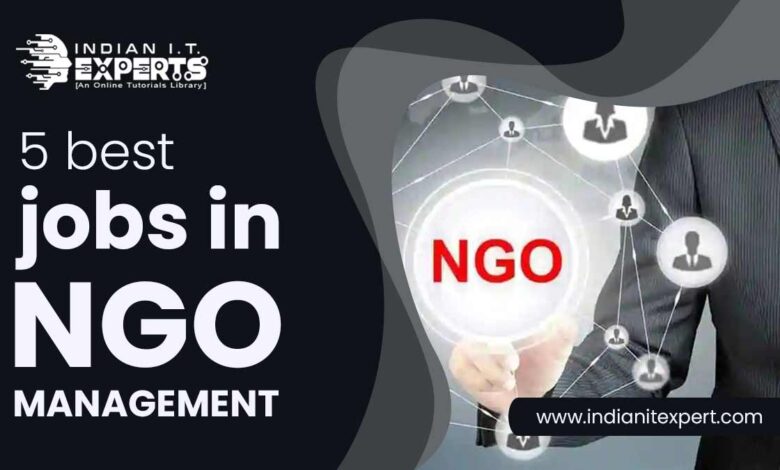5 Best Jobs in NGO Management | 5 NGO Job Types

You can get a secure and respective job in NGO so, go through the topic 5 best jobs in Ngo management. NGO Management is a course designed for candidates who want to pursue a career in social work or work for a non-governmental organization (NGO). Sustainable Development, Strategic Management and Planning, Operational Planning, Communication, Leadership, Fundraising, and Project Management are all part of this.
Table of Contents
NGO Management Skill Set Requirements:
- Capabilities for leadership.
- Capabilities for effective communication
- The ability to work in high-stress situations.
- Leadership abilities.
- The ability to work as part of a team.
- The ability to work long hours in the field.
- Analytical and logical reasoning abilities are required.
- Creativity and foresight are required.
Criteria for NGO Management Eligibility:
- The minimum eligibility criteria for NGO Management vary by level. Candidate must have completed Class 12 with a minimum of 50 percent aggregate in any stream from a recognized board or university to be eligible for an undergraduate or certificate course in NGO Management.
- To be eligible for a postgraduate course, the candidate must have a bachelor’s degree, preferably in social work or a related field.
- To be eligible for an MBA in NGO Management, the candidate must meet the basic MBA requirements, which include a 50 percent aggregate in graduation from a recognized university.
- It is preferable to have prior work/field experience in social work.
Check Also:
- How to Prepare for Telephonic Interview | Interview Tips
- Keep These 6 Things in Mind During a Job Interview
- Best Part-Time Jobs for College Students in Delhi
- How do You Get a Job in AI Without a Degree?
- Top 10 Highest-Paying Private Jobs in India
The 5 best job profiles after doing the NGO Management course are as follows: | Best Jobs in NGO Management
1. District program manager
District program manager: The district program manager is in charge of the program’s planning and design, as well as proactively monitoring its progress, resolving issues, and initiating appropriate corrective action. District Program Managers are in charge of ensuring that larger organizational goals are met at the district level. They coordinate efforts across multiple projects without being in charge of any of them. Instead, they oversee the entire program, paying close attention to strategy, implementation, and delegation.
The following are the requirements for becoming a District Program Manager:
- A bachelor’s or master’s degree in business or a related field is required.
- Proven program management experience.
- Demonstrated stakeholder management abilities.
- Experience leading a team is required.
- Hands-on experience with computers for a variety of tasks.
The skills required to become a District Program Manager are as follows:
- Effective leadership.
- Excellent interpersonal skills.
- Capable of effective communication.
The following are the duties of a District Program Manager:
- Plan programs and activities in accordance with the organization’s mission and goals.
- Creating new programs to support the organization’s strategic direction.
- Setting and managing long-term objectives.
- Creating a program budget and operating plan.
- Creating a method for assessing program strengths and identifying areas for improvement.
Average Salary:
The average annual salary of a District Program Manager is Rs. 4.7 lakhs per annum.
2. Senior executive human resources
Senior executive human resources: A senior HR Executive oversees the recruitment process and ensures that candidates are a good fit for the role and the company culture. He coordinates and manages new employee orientation, probationary reviews, employee evaluations, and terminations.
The following are the requirements for becoming a Senior Human Resources Executive:
- A master’s degree in human resources or related qualification is required.
- Prior experience as a Senior Human Resources Manager or in a related position.
- Extensive knowledge of HR management software such as applicant tracking systems, payroll systems, and so on.
- Thorough understanding of labor registration.
The following skills are required to become a senior human resources executive:
- They should be excellent communicators.
- They should be ethical.
- They should be skilled negotiators.
- They should be exceptionally organized.
- They should have good Problem-solving abilities.
- They should have good mentoring abilities.
A Senior Human Resources Executive’s responsibilities are as follows:
- Establish goals for the HR team and track their progress.
- Create and implement company policies that promote a healthy workplace.
- Create a compensation and benefits plan.
- Assist with and make suggestions for improvements to the entire recruitment process.
- Organize internal recruitment events.
Average Salary:
Senior HR Executive salary in India ranges from ₹ 2.4 Lakhs to ₹ 7.5 Lakhs with an average annual salary of ₹ 4.1 Lakhs.
3. Business development manager:
A Business Development Manager is a professional who is in charge of the expansion of their department. They collaborate with their sales team to create mutually beneficial proposals, negotiate contract terms, and effectively communicate with stakeholders. When a new potential client enquires about a company’s products and services; the business development manager (BDM) is frequently the first point of contact.
Requirements for a Business Development Manager:
- A bachelor’s degree in business, marketing, or a related field is required.
- Sales, marketing, or a related field experience
- Excellent communication and information technology skills.
- The ability to manage complex projects while also multitasking.
- Outstanding organizational skills.
The following skills are required to become a Business Development Manager:
- Excellent communication skills.
- Superior organizational abilities.
- They should have strong ethics.
- They should be excellent negotiators.
- Capabilities for effective mentoring.
- Analytical abilities.
The responsibilities of a Business Development Manager are as follows:
- Make contact with potential clients in order to establish rapport and set up meetings.
- Developing and implementing new marketing initiatives.
- Conduct research on organizations and individuals to identify new opportunities.
- Increasing the worth of existing customers while attracting new ones.
- Finding and developing new markets, as well as increasing sales, are all priorities.
Average Salary:
Business Development Manager Salary in India ranges from ₹ 2.4 Lakhs to ₹ 16.0 Lakhs with an average annual salary of ₹ 5.2 Lakhs.
4. It executive:
It executive: IT (information technology) executives manage their organizations’ information technology needs and systems, which includes implementing database and network designs, installing and upgrading software, ensuring system security, and troubleshooting computer issues.
The following are the requirements for becoming an IT Executive:
- A bachelor’s degree or higher in a technical field, such as computer science or systems administration.
- They may also have an MBA, which many employers regard as a strong indicator of business understanding and leadership.
The following skills are required to become an IT Executive:
- A bachelor’s degree in computer science.
- A bachelor’s degree in information technology is required.
- Extensive SQL knowledge.
- Extensive Programming Experience.
- Thorough understanding of Windows.
- Excellent networking skills.
The following are the responsibilities of an IT Executive:
- Oversee Tech Departments: T executives keep an eye on the activities and output of tech departments. Managers keep them informed of progress and concerns. IT executives deal with this data and share it with other senior leaders in order to paint a clear picture of technical operations and how they fit into overall procedures.
- Strategize Technology Improvements: When top executives decide where they want the company to focus its efforts, they turn to IT executives for guidance on how to turn visions into reality. Using their technical knowledge, IT executives explain what would be required to put the idea into action, such as purchasing software or hiring additional tech staff.
- Manage the IT Budget: Most businesses do not have unlimited funds. IT executives must work within financial constraints to get the most out of the equipment, programs, and manpower at their disposal. They must also determine which new technology will be most beneficial and consider the cost of acquiring it. This process necessitates difficult decisions, such as whether to postpone scheduled computer model upgrades in order to redesign the security system instead.
- Understand Company and Industry Trends: Senior executives should be well-versed in their company’s products, services, customers, competitors, and markets. They must be willing to step outside of their current actions and comfort zone in order to find ways to improve. When your specialty is information technology, keeping up with technological advances and evaluating how they might be implemented for the benefit of the organization is a top priority.
- Develop Talent: IT executives monitor technical employees. Bringing in new staff members with specific training to address specific needs, or grooming internal team members to take on positions of greater responsibility, are examples of such actions.
Average Salary:
IT Executive salary in India ranges from ₹ 1.5 Lakhs to ₹ 6.0 Lakhs with an average annual salary of ₹ 3.0 Lakhs.
5. Fundraiser
Fundraiser: A fundraiser is an event that is held to raise money for a specific purpose, such as a charity. Fundraisers assist organizations in meeting both short- and long-term financial objectives. They do this by locating individuals, corporations, and foundations in their communities who are willing to donate money to the cause.
The following are the requirements for becoming a Fundraiser:
- Have a high school diploma.
- Work experience in a fundraising capacity.
- Persuasion and creativity skills.
- Pay attention to the details.
- Excellent organizational abilities.
- Outstanding leadership abilities.
The following abilities are required to become a Fundraiser:
- Contribute to your local charity’s cause on a daily basis.
- The ability to form and keep relationships.
- Fundraising requires creativity, imagination, and an entrepreneurial mindset.
- A proactive attitude, drive, and enthusiasm for seeing projects through to completion.
- The ability to persuade others through effective communication skills.
- The ability to work under pressure and meet deadlines.
A Fundraiser’s responsibilities are as follows:
- Investigating potential sponsors.
- Developing funding proposals and submitting them to potential sponsors.
- Developing marketing and promotional strategies.
- Organizing fundraising events.
- Keeping track of sponsors.
- Organizing donation-generating campaigns.
- Volunteer training.
Average salary:
In India, the national average salary for a Fundraiser is Rs. 20,651 per month. This means that a Fundraiser in India earns Rs. 2,47,812 per annum.
Conclusion:
In the above article, we have learned about the 5 best jobs after doing the NGO Management course. NGOs are linked to government or private-sector organizations. They address issues such as women’s empowerment, girl child, gender issues, education, pollution, street children, slum dwellers, health, urban development, human rights, concerns of the underprivileged, and so on. As a result, NGO Management students in India will have a lot of opportunities in the future.
FAQs on NGO Management:
-
Question: What are the most important questions to ask as an NGO manager?
There are four critical questions that any NGO manager must ask themselves in order to ensure clear program planning and execution. These are the four questions:
· What exactly do we want?
· What have we got?
· How can we make the best of what we have to get what we want?
· What will happen if we succeed?
After answering these questions, any campaign’s planning will become
Clearer and more effective. -
What are the various sources of funding for non-governmental organizations?
NGO funding can come from a variety of sources, depending on the severity of the problem being addressed. These sources can include government funding, corporate funding through corporate social responsibility or otherwise, public donations, and funding agencies.
-
What are some of the most well-known colleges in India for NGO management?
The Tata Institute of Social Sciences (Mumbai), Indian Institute of Social Welfare and Business Management (Kolkata), Amity Institute of NGO Management (Noida), Institute of Management and Technical Studies (Bangalore), and Era University (Lucknow), among others, are popular colleges for NGO Management in India.
-
What are some of the best colleges in the world for NGO management?
Among many others, good colleges for NGO Management abroad include the University of London (UK), Arizona State University (USA), Concordia University (Canada), Queen’s University (Ireland), and Liberty University (USA).




